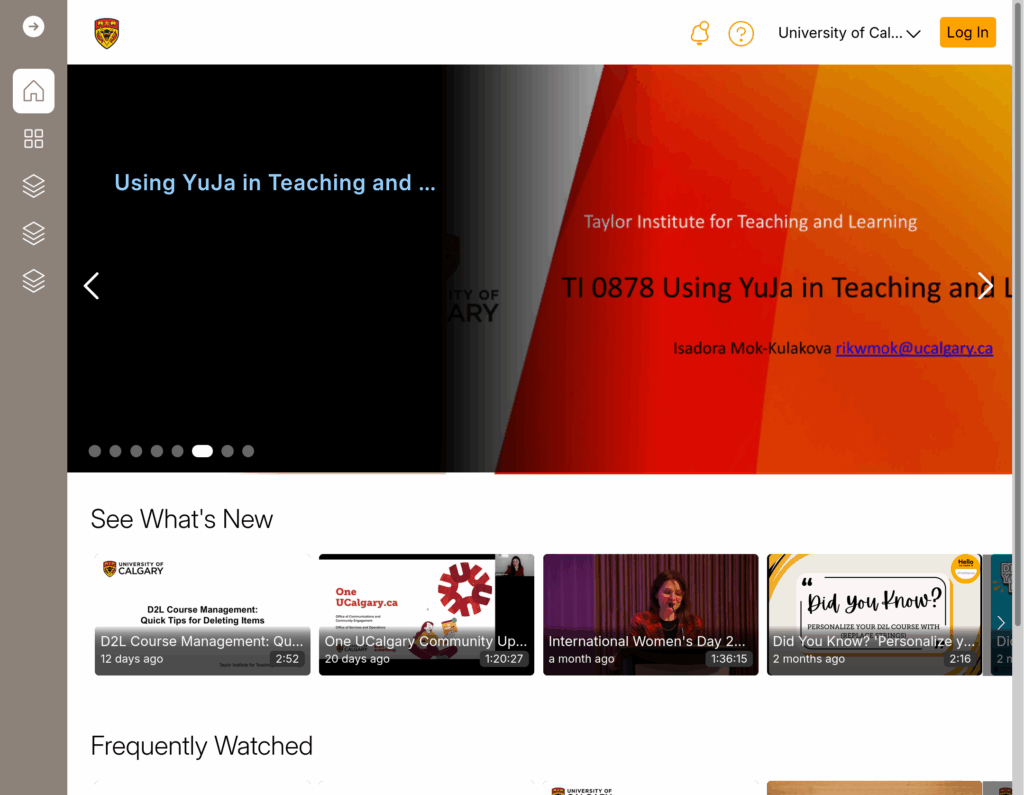YuJa
YuJa is the university’s video hosting/ content management system. It can be used as a stand-alone tool and also within your D2L course. YuJa allows you to upload and share your videos, create screen captures via a free desktop software and caption your content.
The YuJa Enterprise Video Platform is an all-in-one video experience to securely create, manage, discover, collaborate, and live stream video content across any device, at any time.
Types of uses
- publishing and sharing videos with your class
- automatically converting videos into formats for viewing on any device or internet connection
- recording videos (including video from your webcam, or from recording your screen)
- lecture capture
- livestreaming (to unlimited viewers)
- sharing meetings recorded in Zoom
- editing videos (including those not created in YuJa and uploaded from external sources)
What it looks like

Considerations before using this tool
- Develop a plan for how to respond if a student, faculty or staff member has a negative experience on the site.
- How will you be able to identify is someone is being targeted? How can you mitigate any online harassment that might take place?
- What do you want students, faculty or staff to do if they feel uncomfortable in this online space?
- How will you comply with relevant retention rules?
- How will you structure the site to promote academic integrity?
Support available
- UService (IT)
- Taylor Institute:
- UCalgary elearn resources: Getting Started with YuJa
- workshops: workshop calendar, training videos
- consultations: one-on-one consultation, learning technology coaches
- YuJa
Useful information and tips
- How To Make Your Online Courses More Effective with A Video Platform
- Five Ways YuJa Can Help Students And Teachers Adapt To An Online Learning Environment
- 8 Ways to Use Video for Education
About this tool
Name: YuJa
Vendor: YuJa, Inc.
Website: https://yuja.ucalgary.ca
Cost: Free (campus license provided)
Status: core platform. Integrated with campus logins, Brightspace (D2L), and Zoom.
Approved for:
Level 1 Data: Public
Public is defined as:
- Information deemed to be public by legislation and/or under University policy
- Information in the public domain
Examples include:
- names of employees and
- business contact information
- job profile
- salary range
- discretional benefits
- relevant education
- names of registered students and
- dates of registration
- program of registration
- degree awarded
- convocation date
- annual reports
- public announcements
- telephone directory
- published research data
Level 2 Data: Internal Use
Internal Use is defined as:
- Information not approved for general circulation outside the University
- Information the disclosure or loss of which would inconvenience the University although it would unlikely result in financial loss or reputational damage
Examples of this include:
- internal memos sent to all members of a department
- minutes of department meetings that are circulated to all members of a department
- unpublished research data
- anonymized or de-identified human subject data
- library transactions and journals
Level 3 Data: Confidential
Confidential is defined as:
- Information that is available only to authorized persons
- Information the disclosure or loss of which could seriously impede the University’s operations
- Information the disclosure or loss of which may:
- adversely affect the University’s operation; or
- cause reputational damage; and
- obligate the University to report to the government or other regulating body and/or provide notice to affected individuals.
Examples include:
- faculty/staff employment applications, personnel files, date of birth, health information and personal contact information
- admission applications
- student enrollment status
- donor or prospective donor name and contact information
- information commonly used to establish identity such as a driver’s license or passport
- contracts
- intellectual property
- authentication verifiers including:
- passwords
- shared secrets
- cryptographic private keys
Software license: Commercial, proprietary
Hosting: Servers hosted by vendor

